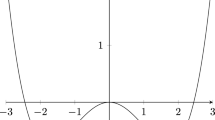Abstract
In this paper, we consider a zero-sum stochastic game with finitely many states restricted by the assumption that the probability transitions from a given state are functions of the actions of only one of the players. However, the player who thus controls the transitions in the given state will not be the same in every state. Further, we assume that all payoffs and all transition probabilities specifying the law of motion are rational numbers. We then show that the values of both a β-discounted game, for rational β, and of a Cesaro-average game are in the field of rational numbers. In addition, both games possess optimal stationary strategies which have only rational components. Our results and their proofs form an extension of the results and techniques which were recently developed by Parthasarathy and Raghavan (Ref. 1).
Similar content being viewed by others
References
Parthasarathy, T., andRaghavan, T. E. S.,An Order Field Property for Stochastic Games when One Player Controls Transitions, Journal of Optimization Theory and Applications, Vol. 33, No. 3, 1981.
Filar, J. A., andRaghavan, T. E. S.,An Algorithm for Solving an Undiscounted Stochastic Game in Which One Player Controls Transitions, Research Memorandum, University of Illinois, Chicago, Illinois, 1979.
Bewley, T., andKohlberg, E.,On Stochastic Games with Stationary Strategies, Mathematics of Operations Research, Vol. 3, pp. 104–125, 1978.
Blackwell, D.,Discrete Dynamic Programming, Annals of Mathematical Statistics, Vol. 33, pp. 719–726, 1962.
Shapley, L. S.,Stochastic Games, Proceedings of the National Academy of Science, Vol. 39, pp. 1095–1100, 1953.
Shapley, L. S., andSnow, R. N.,Basic Solutions of Discrete Games, Annals of Mathematics Studies, Princeton University Press, Princeton, New Jersey, Vol. 24, pp. 27–37, 1950.
Author information
Authors and Affiliations
Additional information
Communicated by G. Leitmann
The author wishes to thank Professor T. E. S. Raghavan for introducing him to this problem and for discussing stochastic games with him on many occasions. This research was supported in part by AFOSR Grant No. 78–3495B.
Rights and permissions
About this article
Cite this article
Filar, J.A. Ordered field property for stochastic games when the player who controls transitions changes from state to state. J Optim Theory Appl 34, 503–515 (1981). https://doi.org/10.1007/BF00935890
Issue Date:
DOI: https://doi.org/10.1007/BF00935890



